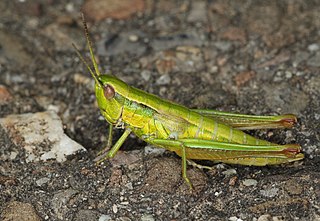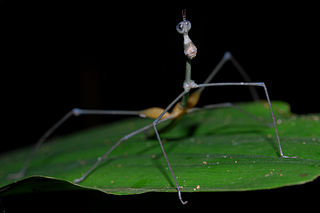
The Melanoplinae are a subfamily of grasshoppers in the family Acrididae. They are distributed across the Holarctic and Neotropical realms. They are one of the two largest subfamilies in the Acrididae. As of 2001 the Melanoplinae contained over 800 species in over 100 genera, with more species being described continuously. The genera of the Melanoplinae are classified in 7 tribes, including Conalcaeini, Dactylotini, Dichroplini, Jivarini, Melanoplini, Podismini, and Prumnini.

Tettigidea is a genus of pygmy grasshoppers in the family Tetrigidae. There are at least 40 described species in Tettigidea found in the Americas.

Gryllacrididae are a family of non-jumping insects in the suborder Ensifera occurring worldwide, known commonly as leaf-rolling crickets or raspy crickets. The family historically has been broadly defined to include what are presently several other families, such as Stenopelmatidae and Rhaphidophoridae, now considered separate. As presently defined, the family contains two subfamilies: Gryllacridinae and Hyperbaeninae. They are commonly wingless and nocturnal. In the daytime, most species rest in shelters made from folded leaves sewn with silk. Some species use silk to burrow in sand, earth or wood. Raspy crickets evolved the ability to produce silk independently from other insects, but their silk has many convergent features to silkworm silk, being made of long, repetitive proteins with an extended beta-sheet structure.

The Phaneropterinae, the sickle-bearing bush crickets or leaf katydids, are a subfamily of insects within the family Tettigoniidae. Nearly 2,060 species in 85 genera throughout the world are known. They are also known as false katydids or round-headed katydids.
Peruvia is a genus of South American grasshoppers comprising two species:

Gomphocerinae, the slant-faced grasshoppers, are a subfamily of grasshoppers found on every continent but Antarctica and Australia.
Itauna is a synonym for the South American genus QuivaHebard, 1927: a bush cricket in the subfamily Phaneropterinae.

Gryllacridinae is an Orthopteran subfamily in the family Gryllacrididae.

Meconematinae is a subfamily of the bush crickets, with a worldwide distribution.

The Copiphorini are a tribe of bush crickets or katydids in the family Tettigoniidae. Previously considered a subfamily, they are now placed in the subfamily Conocephalinae. Like some other members of Conocephalinae, they are known as coneheads, grasshopper-like insects with an extended, cone-shaped projection on their heads that juts forward in front of the base of the antennae.

Conocephalinae, meaning "conical head", is an Orthopteran subfamily in the family Tettigoniidae.
Montezumina is a genus of phaneropterine katydids in the family Tettigoniidae. There are at least 30 described species in Montezumina.

Metrodorinae is a subfamily of groundhoppers or pygmy grasshoppers. There are at least 90 genera and more than 590 described species, found in South America, Africa and Asia.

Markia is a genus of katydids found in Central and South America.

Orophus is a small genus of katydids native to Mexico, Central America, and South America.

Proscopiinae is a subfamily of grasshoppers in the family Proscopiidae. There are more than 20 genera and 190 described species, found in South America.
Hyperbaeninae is a subfamily of Orthopterans, sometimes known as 'leaf-folding crickets' in the family Gryllacrididae; Hyperbaenus ensifer is the type species. The known distribution includes tropical: central and southern America, Africa and mainland Asia to Australasia.

Gryllini is a tribe of crickets and typical of the family Gryllidae. Species are terrestrial, carnivorous or omnivorous and can be found in all continenents except Antarctica.

Neocurtilla is a genus of northern mole crickets in the family Gryllotalpidae. There are about seven described species in Neocurtilla, found parimarily in North, Central, and South America.
Apterolarnaca is a genus of Orthopterans, sometimes known as 'leaf-folding crickets' in the subfamily Gryllacridinae, tribe Ametrini and genus group ApotrechaeCadena-Castañeda, 2019. Records of occurrence are from southern China and Vietnam.














